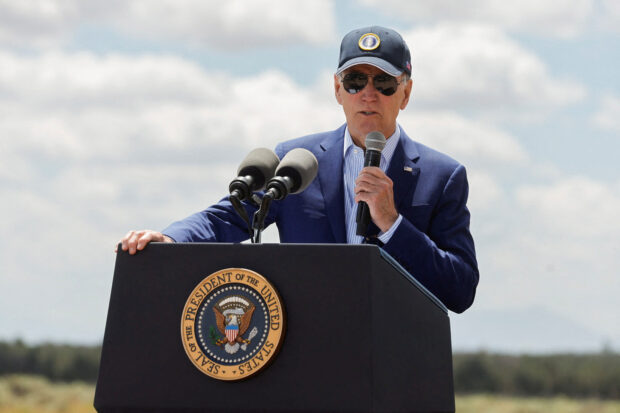
U.S. President Joe Biden delivers remarks on his administration’s conservation efforts on the day he signs a proclamation establishing the Baaj Nwaavjo I’tah Kukveni – Ancestral Footprints of the Grand Canyon National Monument, at the Historic Red Butte Airfied in Tusayan, Arizona, U.S., August 8, 2023. REUTERS FILE PHOTO
WASHINGTON/JAKARTA — U.S. President Joe Biden is unlikely to attend summits with Southeast Asian leaders in Jakarta next month, multiple sources told Reuters, an absence that would raise questions about U.S. commitment to a region vital in its efforts to push back against China’s expanding influence.
Biden is due to attend a Sept. 9-10 G20 summit in India and said on Tuesday he plans to visit an important emerging Southeast Asian partner Vietnam “shortly” to upgrade ties, but his presence at the Sept. 4-7 summits of the 10-nation Association of Southeast Asian Nations (Asean) is in significant doubt.
One source close to the matter said Biden would not go to Indonesia, and another cited a Washington-based ambassador from an Asean member as saying that Indonesia had been informed on Monday that Biden would not be going. Other sources cited White House officials as saying that Biden’s attendance was “unlikely.”
Asked if it was correct that Biden would not be going to Indonesia, a senior White House official told Reuters on Tuesday: “We’re still working on it … we’ll probably have more to say about it soon.”
White House spokespersons did not immediately respond to a request for comment. Sources said Biden’s schedule for Asia is not official until it has been announced and could change.
Several Asean diplomats said it would be a significant disappointment if Biden did not go to Jakarta, given the public emphasis his administration puts on the importance of ties with the region.
One senior diplomat referred to Indonesia having scheduled the Asean summits, which are normally held in November, for September, specifically to make is possible for Biden to attend and then go on to the G20.
Sources said Biden was expected to send Vice President Kamala Harris in his place. Harris, the first Asian American vice president, has conducted diplomacy in the region before.
Disappointment in region
Biden already caused disappointment in the region when he canceled what would have been the first visit by a serving U.S. president to Papua New Guinea in May and a subsequent planned visit to Australia because he was working to close a deal with lawmakers to resolve the U.S. debt ceiling crisis.
In an address to an Asean-related event in Washington on Tuesday evening, Biden’s deputy national security adviser Jonathan Finer hailed the U.S.-Asean relationship and said that “Asean centrality” was at the heart of the administration’s strategy for the Indo-Pacific region.
Policy analysts said another no-show by Biden, who attended Asean meetings in Cambodia in November, would call that characterization into question.
“It will be viewed as another let down by the region,” said Murray Hiebert, a senior associate with the Southeast Asia program at Washington’s Center for Strategic and International Studies.
“Southeast Asia has been impressed that Washington under Biden has stepped up engagement with the region,” Hiebert said.
“For him to skip the summit when he will already be nearby attending a summit in India, and likely making an official visit to Vietnam, will prompt many in the region to wonder whether the U.S. is again slipping back to its episodic and half-hearted engagement with the region.”
Ted Osius, a former U.S. ambassador to Vietnam who heads the U.S.-Asean Business Council, said there would likely be some disappointment if Biden was unable to go to Jakarta, although he stressed the “dramatic” increase in U.S. government-to-government engagement with Asean under Biden, a Democrat.
Asean members were unhappy when Biden’s Republican predecessor Donald Trump skipped regional summits for three consecutive years, something policy experts saw as playing into China’s expansion of its influence in the region.
Trump’s predecessor Barack Obama attended every U.S.-Asean and East Asia summit from 2011, apart from 2013, when he canceled due to a government shutdown at home.